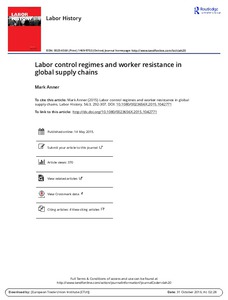Labor control regimes and worker resistance in global supply chains

2015
56
3
July
292-307
clothing industry ; labour relations ; international trade union ; strike ; outsourcing ; wages
Bangladesh ; Honduras ; Vietnam
Labour relations
http://dx.doi.org/10.1080/0023656X.2015.1042771
English
Bibliogr.
"This article seeks to examine two inter-related dynamics, the relationship between the international dispersion of apparel production and labor control regimes, and the relationship between labor control regimes and patterns of worker resistance. The article argues that where apparel production has concentrated in the last decade has as much to do with labor control regimes as with wages and other economic factors. It suggests that there are three main labor control regimes in the sector: state control, market despotism, and employer repression. The article then argues that these systems of labor control are conducive to three patterns of worker resistance: wildcat strikes, international accords, and cross-border campaigns. The article explores these arguments by examining examples of apparel global supply chains in Vietnam, Bangladesh, and Honduras."
Digital
The ETUI is co-funded by the European Union. Views and opinions expressed are however those of the author(s) only and do not necessarily reflect those of the European Union or the ETUI.